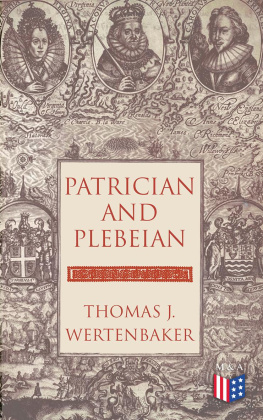1999 The University of North Carolina Press
All rights reserved
Designed by April Leidig-Higgins
Set in Minion by Keystone Typesetting, Inc.
Manufactured in the United States of America
The paper in this book meets the guidelines for permanence and durability of the Committee on Production Guidelines for Book Longevity of the Council on Library Resources.
Library of Congress Cataloging-in-Publication Data
Tatum, W. Jeffrey. The patrician tribune : Publius Clodius Pulcher
/ by W. Jeffrey Tatum.
p. cm.(Studies in the history of Greece and Rome)
Includes bibliographical references and index.
ISBN 0-8078-2480-1 (alk. paper)
1. Clodius, Publius, ca. 93-52 B.C. 2. PoliticiansRomeBiography. 3. RomePolitics and government265-30 B.C. I. Title. II. Series.
DG260.C63T37 1999 937.06092 [B]DC21 98-37096 CIP
Portions of this work were previously published, in somewhat different form, in Ciceros Opposition to the Lex Clodia de Collegiis? Classical Quarterly 40 (1990): 18794, and The Poverty of the Claudii Pulchri: Varro, De Re Rustica 3.16.12, Classical Quarterly 42 (1992): 190200, and are reproduced here by permission of Oxford University Press.
03 02 01 00 99 5 4 3 2 1
THIS BOOK WAS DIGITALLY PRINTED.
Preface
This, however, is not painting a portrait; but gauging the length and breadth of several features, and jotting down their dimensions in arithmetical ciphers. CARLYLE
Clodius Pulcher has always been deemed important, in varying guises. He attracts the attention of the critic of Catullus and of the student of Cicero. His transition from patrician to plebeian status alerts the historian of early Rome. His participation in and legislation on constitutional and religious matters, as well as his mobilization of popular demonstrations and violence, are topics that in themselves and in their connections impinge upon significant aspects of Roman legal and cultural history. And his political career, in the final decade of the republic, looms too large for anyone to overlook it. Nevertheless, for far too long scholars were disposed to regard Clodius, if not actually as something of a bizarre and awful prodigy, then rather narrowly as the enemy (of Cicero, of the optimates, of the state, of the prevailing social order) or as a virtual cipher (for Crassus, for Caesar, for the dynasts). The inclination to reduce Clodius to someones foil or fill-in had the effect of tending to eliminate Clodius himself from consideration as a factor in as well as a product of the events of the fifties. Nor was the study of Clodian legislation, or of other issues associated with Clodius, unaffected by this habitual simplification.
Everything was transformed in 1966, when Erich Gruen, in a seminal article, rejected past depictions of Clodius as a mere instrument. On the contrary, Gruen insisted, it was necessary to view Clodius as an independent agent, an argument he advanced with compelling clarity and conciseness. Incisive and penetratingand revisioniststudies followed immediately, the best of which remain those of Lintott and Rundell. Gruens article has done so much to reinvigorate and to advance our appreciation of Clodius that one fears the accusation of ingratitude if one ventures to criticize it. But it must be said that Gruen, and perhaps too many of his successors, go too far in their revisionism. Gruens Clodius, simply but I think fairly put, possesses such consistent and extraordinary independence as neither Cicero nor even Caesar could display. In other words, the pendulum swung too far to the other extreme. The problem lies in the radical polarity imposed upon our estimation of Clodiuss performance in political life. The treatment of Clodius offered here, though far closer on this point to Gruen than to his predecessors, strives to achieve a more balanced view. It will be for others, of course, to adjudicate its success. In any case, there is more to Clodiuss politics than his relationship with the dynasts, and the pages that follow attempt to cover, sometimes in necessarily technical detail, other dimensions of Clodiuss political triumphs and failures.
Biographical studies of Clodius have not been plentiful. The brisk survey by Lacour-Gayet, while not without value, reads (more transparently than most accounts of late republican history) as a pastiche of Ciceronian excerpts, filled in with odd bits of Plutarch and Dio. Far more valuable, indeed still worthwhile on its own terms, is the monograp-hlength article in volume two of Drumann and Groebes Geschichte Roms, the faults of which are due mostly to its being so outdated. The present book represents the first biography of Clodius Pulcher in English and, so far as I know, the first modern biography in any language.
Which is not to say that there has been a shortage of scholarship devoted to Clodius. In recent years Clodiuss life and career have been illuminated, from a variety of perspectives, by numerous books and articles. To offer a doxography is to invite invidia, but there can be no overlooking the technical contributions of Linderski and Flambard, the flood of publications by Loposzko, the careful and elegant researches of Moreau, or the sociological advances made by Nippel. My debts to these scholars, and to many others, I have endeavored to document in my notes. They will be obvious in the text in any case. Two fairly recent works require specific comment. Frequent reference will be made in the following passages, often in dissent, to P. J. J. Vanderbroecks Popular Leadership and Collective Behavior in the Late Roman Republic (ca. 8050 B.C.) and to H. Benners Die Politik des P. Clodius Pulcher. This should not be taken as a negative commentary on the usefulness of either volume, especially of the former. And their abundant presence in my notes attests to the seriousness with which I take both studies. But I cannot deny that my premises, my approaches, and, consequently, my conclusions are frequently (and frequently notably) different from either Vanderbroecks or Benners.
Because varying premises about the nature of political and social life in the late republic can lead to divergent interpretations of the same events, I have thought it best to state my prepossessions plainly and from the start. Hence the opening chapter, which is my own synthetic representation of the nature of Roman politics and some of the main problems affecting its study. I do not aver that the chapter is markedly original, only that it serves to indicate the understanding of Roman politics and society that will subtend my investigation of Clodiuss career. At the very least, I hope that it will clarify for the reader what is here meant by, say, popularis, or what I take to be some of the central complexities that confronted all Roman statesmen. Thereafter the shape of the book is one natural to a biographical approach: it is chronological, though with excursions into constitutional, religious, and legal matters embedded in the narrative. These excursions are not by any means digressions; quite the contrary: in my view they are every bit as important to a proper understanding of Clodiuss significance to the late republic as is the narrative of Clodiuss trials, campaigns for office, political violence, and public posturing. No apologies, I trust, are required for a discussion of the late republic which takes Clodius as its emphasis and unifying principle. I hope that I will not be charged with having succumbed to any great man philosophy of history.
I come now to the acknowledgments, the part of the book I have most looked forward to writing. The research on which this study is based was funded in part by grants from the Council on Faculty Research of The Florida State University, whose assistance I happily recognize. My gratitude to those who have read and criticized my work, in toto or in part, by letter or viva voce, as well as to those who have throughout this project helped and encouraged me, is immeasurable. Which makes it a pleasure for me to express my thanks to the late A. E. Astin, Ernst Badian, Tom Hillard, Allan Kershaw, Christoph Konrad, T. Loposzko, Philippe Moreau, and Christopher Ratt. I have benefited enormously from the kindness and the erudition of Jerzy Linderski and Robin Seager, each of whom has gone far beyond anyones conception of the requirements of friendship. Of my colleagues at The Florida State University, my greatest debts, gladly recalled, are to Hans-Friedrich Mueller, John Kelsay, Jeff Knapp, David Levenson, and Tim Stover. Though I have enjoyed so many benefactors, I am nonetheless especially grateful to Tessa Bartholomeusz, whose support, advice, and friendship have been invaluable. Two notices remain: All that a student can owe to his teacher, that and so much more I owe to M. Gwyn Morgan. And what I owe to Janelle Tatum, who was once my wife and who has endured everything involved in the writing of this book, I need not reduce to words. This book is dedicated to her.




